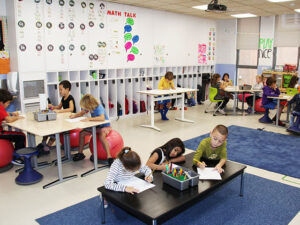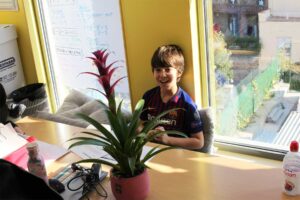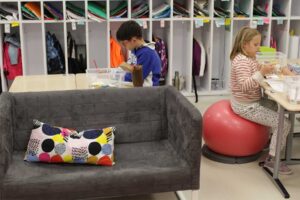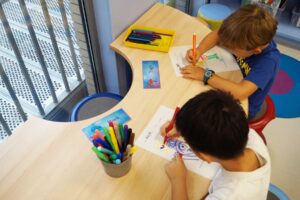Elementary School
At BFIS we recognize that children have an innate curiosity and through our inspiring inquiry-based program, children foster their wonderings and knowledge. We know that our youngest students are competent, creative and resilient learners, who learn best through a ‘hands-on approach’ when making discoveries within a supportive environment.
Fostering development
Our educational program is designed to foster the development of the whole child, focusing on intellectual, social, and emotional growth. Within this rich context, our outstanding faculty aims to cultivate the talent and honor the unique qualities of every child. We strive to help children cultivate a rich understanding of concepts and ideas in addition to developing specific skills that enable them to express, practice, and apply what they are learning each day.
Elementary School program
We place value on the importance of a strong academic foundation, particularly with respect to literacy, mathematics, and multilingual growth. At the same time, we believe that an educational experience is incomplete without an emphasis on social-emotional learning, physical education, and the arts.
The curriculum at BFIS provides a framework that guides the learning experience of students in our community with the intent of providing a cohesive and comprehensive education that builds from year to year. The elementary curriculum is designed with the intent of supporting the growth of what we value most, which is a strong foundation of conceptual understanding, a base of knowledge that provides students with a context and awareness for future learning and set of skills that provide an avenue for student to apply their thinking.
K-12 English Language Arts Philosophy
At BFIS, we believe that a strong English Language Arts curriculum encourages a life-long love and appreciation of reading and writing. We understand that literacy is the key to understanding and communicating with others and we are committed to developing, in our students, the skills of readers, writers, listeners, and speakers.
- We believe that students learn English Language Arts best when:
- students are thinking critically and creatively
- student-centered approaches to teaching and learning are employed
- literary and non-literary texts are studied to offer comprehensive historical, social, and multicultural contexts
- effective communication & collaboration skills are taught and practiced
- students are writing across a variety of text types
- students are reading and analyzing a variety of genres
- students are engaged in ongoing reflection of their progress towards learning targets, standards, and benchmarks
Through our English Language Arts program, students will:
- use writing and reading for inquiry, thinking, and processing ideas
- exhibit the confidence to identify as readers and writers
- demonstrate skills in speaking and reflective listening
- read, discuss, and analyze rich literary and non-literary texts
- embody the mindset and skills of critical consumers and producers of media
- comprehend and communicate across multiple text types to address task, purpose, perspective, and intended audience
- hone their research skills to gather and present information in a variety of oral and written format
*Our curriculum is based off of the Common Core Standards for English Language Arts.
K-12 Social Math Philosophy
At BFIS, we believe that we can use mathematics to describe the world around us. It is our aim to develop joyful, confident, and curious mathematicians. Our mathematics program strives to meet the needs of all learners by providing support and/or enrichment, depending on individual needs. Thus, we promote a curriculum that intends to meet the different needs of our students. This philosophy highlights the shared beliefs and values we hold for our PK-12 mathematics program.
- We believe that students learn mathematics best when they:
- find joy in their learning
- are presented with relevant and realistic contexts or situations
- construct their learning through both individual and collaborative approaches
- take risks and make mistakes in an emotionally safe and nurturing environment
- find patterns and structure through inquiry and investigation
- access the curriculum through differentiated instructional strategies tailored to students’ needs
- feel empowered to use mathematics to solve problems that are relevant to them
Through our mathematics program, students will:
- communicate mathematics, reason, and justify their thinking
- create a process and plan for problem solving
- persevere in solving problems
- develop a conceptual understanding of mathematics
- think and reflect critically, creatively, and logically
- attend to precision
- use appropriate tools strategically
*Our curriculum is based on the Common Core State Standards for Mathematics.
K-12 Science Philosophy
At BFIS, we believe that students should learn science by doing science. Through this hands-on and practical approach to the teaching and learning of science, students are engaged in the inquiry process across the disciplines of Physical Science, Life Science, Earth and Space Science, and the applications of science through Engineering and Technology. All students will complete their studies of the sciences at BFIS through the IB program in grades eleven and twelve. This philosophy highlights the shared beliefs and values we hold for our K-12 science program.
- We believe that students learn science best when they:
- engage in the inquiry process as they conduct investigations
- think critically
- acquire knowledge and skills through student-centered approaches
- apply their science knowledge to explain phenomena and/or to solve real-world problems
Through our science program, students will:
- ask questions as they develop a sense of wonder and curiosity about the way that science and scientists work
- define and solve meaningful, real-world problems
- develop and use models
- plan and carry out investigations
- analyze and interpret data
- use mathematics and computational thinking
- construct explanations
- formulate arguments based on evidence as they engage in ethical and evidence-based debates with peers
- obtain, evaluate, and communicate information and complex understandings using scientific terminology
- apply 21st century skills such as, critical thinking, creativity, collaboration, information literacy, media literacy, technology literacy
*Our curriculum is based on the Next Generation Science Standards.
K-12 Social Studies Philosophy
At BFIS, we believe that a strong social studies curriculum is the key to developing skilled, empathetic, and knowledgeable citizens who are willing and able to take informed action in their community, nation, and world. The shared beliefs and values we hold for our K-12 social studies program are:
- We believe that students learn social studies best when:
- learning is driven by inquiry in order for students to make meaning and find relevance in the content.
- units of study are based on vertically aligned curriculum standards that are rigorous and challenging for all students, with attention to developmental and age appropriateness.
- hands-on and student-centered approaches to teaching and learning are employed. This often includes project-based learning.
- connections are made within and across disciplines through the integration of other subject areas.
- the core values of the school community are reflected and reinforced through the social studies curriculum.
Through our social studies program, students will be able to:
- apply disciplinary tools and concepts in the humanities.
- act as curious learners who plan inquiries to investigate compelling questions.
- think critically and use their knowledge to take informed action.
- demonstrate an understanding of different perspectives throughout history and modern times.
- show empathy and actively engage as global citizens.
- practice 21st century skills, such as critical thinking, collaboration, communication, and problem solving that will prepare them for the challenges of college and/or career and civic life.
*Our curriculum is based off of the C3 Framework for Social Studies Standards
All Elementary students receive daily lessons in Castellano (Spanish speaking students) or Spanish-as-an-Additional Language- SAL (non-Spanish speaking students). One of the key strengths of our program is that students are placed within the appropriate class based on language development in Spanish. Therefore, regardless of whether students are native speakers or completely new to the Spanish language, they have an opportunity to receive instruction that is appropriate for the level of understanding.
Our SAL classes focus on all four domains of language development - listening, speaking, reading, and writing. Our beginning students naturally focus on listening and speaking skills to develop a strong base of oral language skills. As students progress, there is an added emphasis on reading and writing skills to help children develop literacy skills in Spanish.
Overview of Lengua Castellana
- Kinder to 3rd grade meet 5 times a week for L.Castellana.
- 4th and 5th grade have 3 classes of Lengua Castellana and 2 classes of Sociedad (Geografía e Historia) per week.
- The program follows the official Spanish government standards.
- Classes are composed of native Spanish speakers and non-native students who meet grade-level proficiency based on our standardized assessment.
Overview of Catalan
Frequency of class depends on the grade level.
- 1st Grade = 2 classes per week
- 2nd Grade =2 classes per week
- 3rd Grade - 5th Grade = 3 classes per week
The program follows the official Spanish government standards.
All students with Spanish nationality are required to take Catalan.
Non-Spanish students who wish to enroll in Catalan must meet grade level proficiency based on our standardized assessment.
In accordance with the official Spanish curriculum, the contents of Lengua Castellana and Llengua Catalana are organized around two key areas - Oral Expression and Written Competence - with the goal of acquiring competence in the areas of Oral Communication, Writing, Reading, and Audiovisual.
Overview of Sociedad (Ciencias Sociales / Geografía e Historia)
- 4th and 5th grade classes meet 2 days per week
- The program follows the official Spanish government standards.
- All classes are taught in Spanish.
- Classes are composed of native Spanish speakers and non-native students who meet grade-level proficiency based on standardized assessment.
Each unit starts with a reading, video, or PowerPoint presentation. Online activities are presented, maps and graphics elaborated, research from different sources guided and projects completed individually or in small groups. Students have frequently the choice in the format of their final products: a written essay with pictures, posters, PowerPoint, Prezi, oral presentations...
The content integrates geography (territory, climate, and vegetation, landscape, topography, rivers and coasts, conservation areas…), society (population and work, government…), culture (art, folklore, and traditions…) and History.
For students of Spanish nationality enrolled in Grades 1-6:
Spanish legislation requires Spanish students who are enrolled in officially recognized foreign schools in Spain (Law 806/1993) to validate their studies relative to the Spanish equivalent of “Enseñanza Primaria.” Spanish students must, therefore, take the following courses from the Spanish Dept.: “Catalán”, “Castellano,” and “Geografía e Historia.”
Mission
We recognize that international education requires exceptional language learning through which students are able to communicate effectively, develop their cognitive abilities, discover their own identity and share that with others. Our program strives to meet the needs of all different language learners who do not have Spanish as their mother tongue and to provide the needed skills to communicate effectively using Spanish.
Overview of SAL Program
Our program focuses on communication, highlighting the importance of the oral domains at the earliest stages and gradually shifting the focus to written literacy as the student progresses towards a solid foreign language foundation.
International students are welcome to BFIS with any level of Spanish. All students from Kindergarten to fifth grade whose mother tongue is other than Spanish take Spanish as an Additional Language (SAL) and Spanish Catalan Studies classes. Spanish Catalan Studies is a CLIL subject that aims at providing cultural awareness of the hosting country and related Social Studies knowledge using Spanish as the vehicular language. Integrating content and language, our students take advantage of extra exposure to Spanish while acquiring a solid cultural background, simultaneously reinforcing the linguistic acquisition experienced in the classroom of language.
The frequency of Spanish Catalan Studies varies from one grade to another: first and second grade have two classes per week and upper Elementary (third, fourth and fifth grade) have three classes per week. The program is divided into two levels of proficiency for all grades K through 5th grade.
All students have SAL classes on a daily basis.
Placement and evaluation
Non-native speakers of Spanish in grades K- 5th are assessed to determine Spanish language proficiency in all language domains (Reading, Writing, Speaking, Listening). The assessment takes place during the first weeks of the year. Review of the assessment results, along with any of the student’s past records are part of the process to determine the level of Proficiency.
A formal assessment of all identified SAL students takes place again at the end of each school year, in addition to ongoing informal assessments throughout. This summative and formative assessment is the key to both, providing the right proficiency level for the student toward the next year and having the data to observe the students ́ yearly language development. In very specific cases language teachers can request an additional evaluation in January to determine any possible changes in placement.
PK-12 Visual Arts Philosophy
At BFIS, we believe that the study of visual arts is an integral part of everyday life. We know that art is dynamic and ever changing, and as such, our program promotes a life-long engagement and appreciation for art. Visual arts is a critical aspect of a comprehensive learning experience for students in the 21st century. This philosophy highlights the shared beliefs and values we hold for our PK-12 visual arts program.
- We believe that students learn visual art best when they:
- engage in the hands on, conceptual and theoretical aspects of art.
- have a meaningful and authentic purpose for creating art.
- explore art from local, regional, national, international, and intercultural contexts.
- analyze and create thought-provoking art that challenges creative and cultural expectations and boundaries.
- make connections between the arts and other disciplines.
- experiment, take risks, and reflect upon their growth and creative choices as artists.
Through our visual arts program, students will:
- produce and interpret their own creative ideas and expressions as well as the art of others.
- explore communities, societies, and cultures as the context through which art exists.
- recognize various artists and art movements in an everyday context
- use the language of art to create as well as communicate about art work.
- understand how art has influenced and defined history and culture.
- Identify and appreciate various mediums of the visual arts such as: drawing, painting, printmaking, mixed media, photography, ceramics, and sculpture.
- become makers of and participants in visual culture.
- gain skills in organization, self-management, and creative problem solving.
*Our curriculum is based off of the National Core Arts Standards for Visual Arts.
Elementary students have music classes taught by a specialist once or twice a week depending on their schedule. The focus of Elementary Music program is to help children develop a love for music and a strong understanding of specific musical concepts such as rhythm, pitch, and harmony. Classes are designed to provide a balance of music-making and musical theory to create an enjoyable and enriching experience. Students are exposed to different instruments such as ukulele, recorder, drums, and bar instruments.
Our PE program focuses on developing the student in three different domains: physical, cognitive, and emotional. Nursery and Pre-K students have PE every other day and our elementary students have PE classes once or twice a week depending on their schedule. The Major Units of the program are: Touch ball, Handball, Soccer, Hockey, Tennis, Ultimate Frisbee, Basketball, Badminton, Dodge-ball, and Gymnastics. Besides these sports, our units also work other important aspects like Physical Condition and Fitness (speed, endurance, strength, flexibility,coordination, and balance), and Sportsmanship and Teamwork. We use many different games that engage students and help us reach our goals.
The role of the Elementary School Library is to support classroom teachers. Our librarian provides a curriculum which enhances Kindergarten to Grade 5 Literacy Goals. These goals reflect the Common Core Reading Standards as well as the American Association of School Librarians (AASL) Standards for the 21st Century Learner.
All students have a weekly trip to the Elementary School library for a read aloud from the school librarian. We hope to encourage an enduring love for literature through listening to award winning fiction and nonfiction. Students develop a sense of independence as they choose their own books to read by themselves and with a reading partner. Children also can check out books on a regular basis to enjoy at home with family.
The library is open throughout the day and before and after school for all members of the community. Come and use this valuable resource!
The International Society for Technology in Education (ISTE) states, “Today’s students must be prepared to thrive in a constantly evolving technological landscape.” At BFIS, we are integrating the ISTE Standards for Students, which are designed to empower student voice and ensure that learning is a student-driven process.
Within and across our elementary school, students use technology to develop as:
- Empowered Learners
- Digital Citizens
- Knowledge Constructors
- Innovative Designers
- Computational Thinkers
- Creative Communicators
- Global Collaborators
Here are examples of how we develop digital literacy in our learners:
Kindergarten
Students practice beginning iPad skills and vocabulary (tap, swipe, etc.)
Grade 1
Students develop skills needed to populate a digital portfolio.
Grade 2
Students use safe search engines, like Kiddle.
Grade 3
Students develop beginning keyboarding skills.
Grade 4
Students evaluate websites to determine if the information present is accurate.
Grade 5
Students evaluate websites and research independently.
A distinguishing characteristic of the Elementary School is an emphasis placed upon our Social-Emotional Learning (SEL). Our SEL program combines daily routines like our Morning Meeting where each child is greeted by name from classmates, and specific units of study related to topics like celebrating individual differences.
We strongly believe that strengthening social-emotional skills, such as forming friendships, managing emotions, and solving problems constructively, places children on a path for long-term success in all areas of life.

Flexible Seating
Flexible seating and student-centered classroom redesign
Take a look at our Flexible Seating in the Elementary Classrooms. BFIS teachers are transforming their classrooms to make their learning spaces more student-centered, moving away from passive learning environment and moving towards a classroom management learning space.
Family Connections
Throughout the year, parents are invited into their children's classrooms to learn alongside their children, celebrate their progress, provide feedback, or to hear all about their learning adventures.
Parents can help our students make deeper connections to their learning when they visit the classrooms as experts who share their passions, professional careers, interests, and skills.
Several Tuesday mornings each month, parents are invited to the BFIS Cafeteria to learn about a topic related to teaching and learning, child development, school goals, and many other interesting topics.
On Fridays families are invited in the morning to join the EC/ES Principal and other leadership team members of the school for a cup of coffee and informal conversation at the main gate.
















